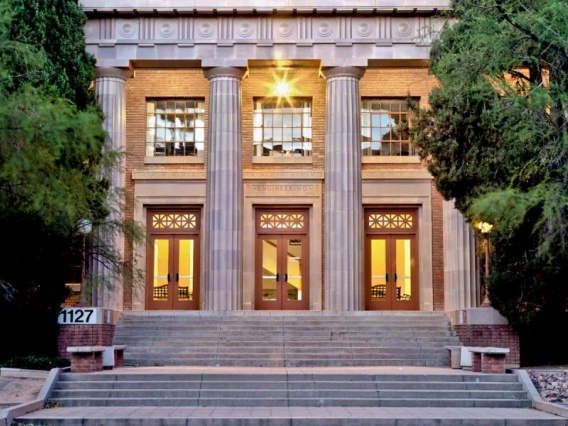NSF CAREER awardee investigates sustainable aluminum alloys
The University of Arizona’s Marat Latypov is developing ways to improve the performance of recycled aluminum alloys and alleviate the environmental impact of aluminum mining.

Marat Latypov, assistant professor of materials science and engineering and applied mathematics, aims to advance environmentally responsible materials design and address workforce gaps as a National Science Foundation awardee.
Aluminum alloys are some of the most recycled materials in the world, with their light weight and versatility making them an easy choice for a multitude of applications in automotive, aerospace and marine industries. However, the properties of aluminum recycled from scrap are much less robust than alloys produced with primary aluminum extracted from ore.
Marat Latypov seeks to change that.
With a $580,000 CAREER Award from the National Science Foundation, Latypov is developing a method to recycle aluminum alloys from post-consumer scrap without compromising the performance and to reduce the energy consumption and carbon footprint of aluminum metallurgy.
“We want to understand how the chemical composition of recycled aluminum alloys, together with processing, determine their structure and their damage response so that we can better navigate the large compositional space of recycled alloys and minimize the need for primary aluminum,” said Latypov, who joined the materials science and engineering department and applied math program as an assistant professor in 2021.
Less mining, more recycling
Primary aluminum, mined from the Earth and reduced from ore, is nonrenewable and requires an energy-intensive and carbon intensive reduction through the Hall-Héroult process. Due to the low melting point, recycling aluminum from scrap is much more environmentally sustainable but significantly deteriorates properties and performance compared with alloys made with primary aluminum.
To address this problem, Latypov wants to understand the damage behavior of alloys in the presence of intermetallic particles, which form as a result of recycling scrap without addition of primary aluminum.
“Once we have that understanding, we can tune the metallurgical processing of recycled alloys to achieve superior mechanical performance with no or minimal use of primary metals,” Latypov said.
With support from the NSF, Latypov is using a combination of experimentation, simulations and machine learning to establish these relationships that will ultimately enable design of superior damage-tolerant alloys and their processing conditions with reduced environmental impact.
Sammy Tin, department head for MSE, noted the award will help Latypov cultivate an active research group of graduate students and boost his reputation as a subject matter expert in metallurgy.
“His work looks at ways we can enhance or continue to maintain the properties of aluminum alloys that are recycled, so it could have a tremendous impact on the ability to reuse these recycled aluminum alloys for upscale, high-performance applications,” Tin said.
Emphasizing education
Latypov said the CAREER Award is instrumental for supporting advances in sustainable metallurgy with educational and workforce development activities.
He said he will leverage the award to engage applied mathematics students in materials research and improve computational skills of materials science students, including the use of rapidly emerging artificial intelligence tools. These activities aim to fill the gap in workforce related to the Materials Genome Initiative, which launched in the U.S. more than a decade ago to accelerate the cycle of materials development.
With his research and educational goals set in motion by the NSF’s support, Latypov can’t wait to make strides in these efforts on sustainable metallurgy and workforce development.
“It’s a fundamental study of the intersection of metallurgy and mechanics of materials, but with a tangible, real world impact,” Latypov said. “That’s exciting.”


